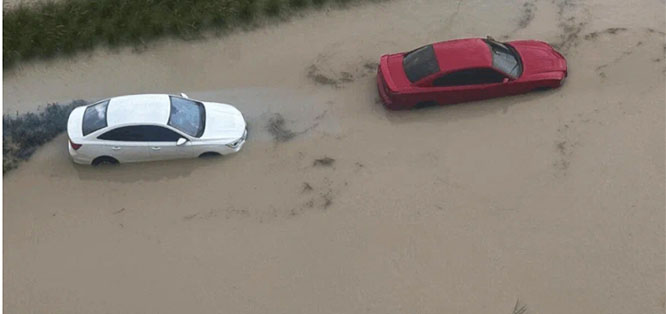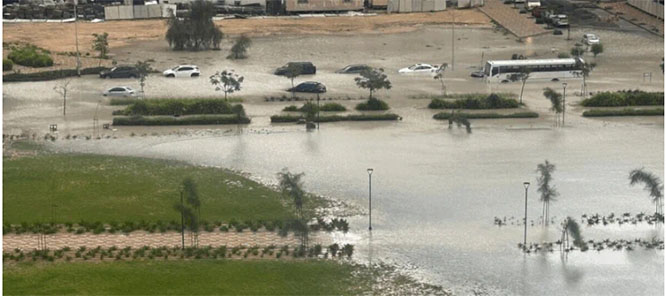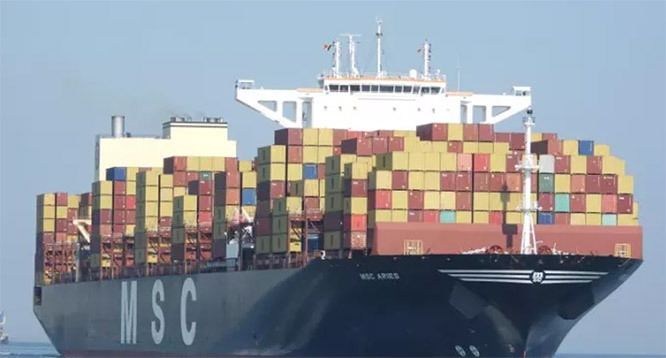UN, Apr 24: Up to one million species face extinction due to human influence, according to a draft UN report obtained by AFP that painstakingly catalogues how humanity has undermined the natural resources upon which its very survival depends.
The accelerating loss of clean air, drinkable water, CO2-absorbing forests, pollinating insects, protein-rich fish and storm-blocking mangroves -- to name but a few of the dwindling services rendered by Nature -- poses no less of a threat than climate change, says the report, set to be unveiled May 6.
Indeed, biodiversity loss and global warming are closely linked, according to the 44-page Summary for Policy Makers, which distills a 1,800-page UN assessment of scientific literature on the state of Nature.
Delegates from 130 nations meeting in Paris from April 29 will vet the executive summary line-by-line.
Wording may change, but figures lifted from the underlying report cannot be altered.
"We need to recognise that climate change and loss of Nature are equally important, not just for the environment, but as development and economic issues as well," Robert Watson, chair of the UN-mandated body that compiled the report, told AFP, without divulging its findings.
"The way we produce our food and energy is undermining the regulating services that we get from Nature," he said, adding that only "transformative change" can stem the damage.
Deforestation and agriculture, including livestock production, account for about a quarter of greenhouse gas emissions, and have wreaked havoc on natural ecosystems as well.
The Intergovernmental Science-Policy Platform on Biodiversity and Ecosystem Services (IPBES) report warns of "an imminent rapid acceleration in the global rate of species extinction." The pace of loss "is already tens to hundreds of times higher than it has been, on average, over the last 10 million years," it notes. "Half-a-million to a million species are projected to be threatened with extinction, many within decades." Many experts think a so-called "mass extinction event" -- only the sixth in the last half-billion years -- is already under way.
The most recent saw the end of the Cretaceous period some 66 million years ago, when a 10-kilometre-wide asteroid strike wiped out most lifeforms.
Scientists estimate that Earth is today home to some eight million distinct species, a majority of them insects.
A quarter of catalogued animal and plant species are already being crowded, eaten or poisoned out of existence.
The drop in sheer numbers is even more dramatic, with wild mammal biomass -- their collective weight -- down by 82 per cent.
Humans and livestock account for more than 95 per cent of mammal biomass.
"If we're going to have a sustainable planet that provides services to communities around the world, we need to change this trajectory in the next ten years, just as we need to do that with climate," noted WWF chief scientist Rebecca Shaw, formerly a member of the UN scientific bodies for both climate and biodiversity.
The direct causes of species loss, in order of importance, are shrinking habitat and land-use change, hunting for food or illicit trade in body parts, climate change, pollution, and alien species such as rats, mosquitoes and snakes that hitch rides on ships or planes, the report finds.
"There are also two big indirect drivers of biodiversity loss and climate change -- the number of people in the world and their growing ability to consume," said Watson. Once seen as primarily a future threat to animal and plant life, the disruptive impact of global warming has accelerated.
Shifts in the distribution of species, for example, will likely double if average temperature go up a notch from 1.5 degrees Celsius (2.7 Fahrenheit) to 2 C.
So far, the global thermometer has risen 1C compared with mid-19th century levels.
The 2015 Paris Agreement enjoins nations to cap the rise to "well below" 2C.
But a landmark UN climate report in October said that would still be enough to boost the intensity and frequency of deadly heatwaves, droughts, floods and storms.
Other findings in the report include:
Three-quarters of land surfaces, 40 per cent of the marine environment, and 50 per cent of inland waterways across the globe have been "severely altered".
Many of the areas where Nature's contribution to human wellbeing will be most severely compromised are home to indigenous peoples and the world's poorest communities that are also vulnerable to climate change.
More than two billion people rely on wood fuel for energy, four billion rely on natural medicines, and more than 75 percent of global food crops require animal pollination.
Nearly half of land and marine ecosystems have been profoundly compromised by human interference in the last 50 years.
Subsidies to fisheries, industrial agriculture, livestock raising, forestry, mining and the production of biofuel or fossil fuel energy encourage waste, inefficiency and over-consumption.
The report cautioned against climate change solutions that may inadvertently harm Nature.
The use, for example, of biofuels combined with "carbon capture and storage" -- the sequestration of CO2 released when biofuels are burned -- is widely seen as key in the transition to green energy on a global scale.
But the land needed to grow all those biofuel crops may wind up cutting into food production, the expansion of protected areas or reforestation efforts.










Comments
Add new comment